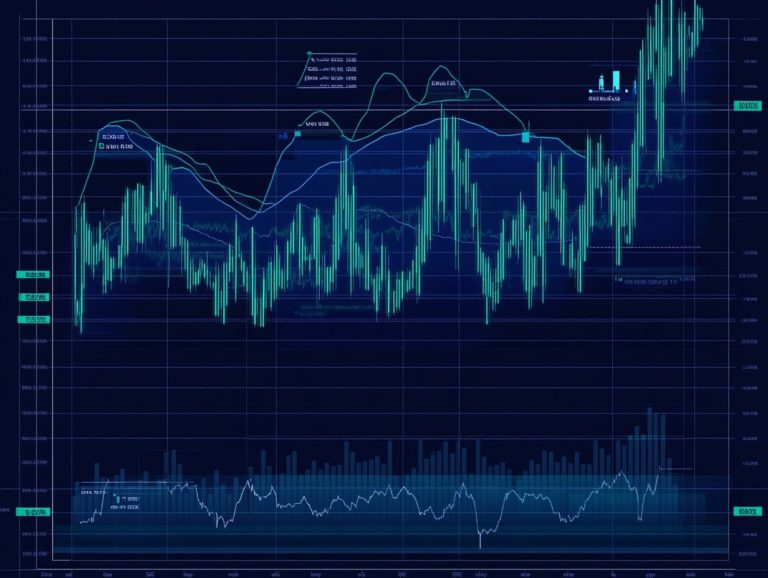How to Avoid Emotional Trading Decisions
Emotions significantly influence trading decisions. They affect both your performance and the broader market dynamics.
This article explores the psychological factors that drive trading behaviors. It highlights emotional traps like fear and greed, offering practical strategies to help you regain control.
By crafting a solid trading plan and sticking to it, you can navigate emotional hurdles effectively.
Discover the thrilling art of trading and gain clarity in your approach!
Contents
Key Takeaways:

- Emotions can significantly impact trading decisions. Understanding the psychological factors behind them is key to avoiding impulsive choices.
- Common emotional trading mistakes include impulsiveness, fear, and greed. Recognizing these emotions is crucial for successful trading.
- Strategies for controlling emotions include practicing techniques, seeking professional help, and having a solid trading plan. Staying disciplined can help maintain emotional stability while trading.
The Impact of Emotions on Trading Decisions
Emotions shape your trading decisions. Understanding how they intertwine with cognitive biases will help you develop emotional resilience and disciplined behavior.
Fear and greed can lead to impulsive choices that disrupt your strategies. Recognizing these factors equips you for success and helps you manage risks in financial markets.
Understanding the Psychological Factors
Understanding psychological factors is crucial for long-term success in trading. You may face cognitive biases and emotional traps that hinder your performance.
For instance, confirmation bias leads you to seek information that supports your beliefs. This can make you overlook vital data that challenges your views.
Lack of emotional intelligence can trigger impulsive reactions. Self-awareness helps you identify personal triggers that may cloud your judgment.
Overlooking these elements risks costly mistakes, like overtrading during a dip or exiting positions out of fear. Understanding the mental aspects of trading is vital.
Common Emotional Trading Mistakes
Emotional trading mistakes can sidetrack even seasoned traders. A lack of emotional control and discipline often leads to these errors, making it essential to learn how to handle market volatility emotionally.
Impulsive decisions driven by fear of missing out or loss aversion result in regrettable choices. Recognizing these pitfalls and learning how to manage investment emotions successfully helps you navigate the trading landscape confidently.
Identifying and Avoiding Impulsive Decisions
Identifying and avoiding impulsive decisions is crucial for your success in trading. To effectively manage this, learn how to avoid emotional trading, as unchecked emotions can lead to significant losses and missed opportunities.
You must cultivate strong emotional control and stick to a well-defined trading plan to mitigate the risks linked to impulsive behavior, as highlighted in understanding the relationship between trading and emotions.
Start by recognizing your emotional triggers, which could range from anxiety to overconfidence. A trading journal can be a powerful tool for you; it allows you to document your thought processes and identify patterns in your decision-making.
Using mindfulness techniques like deep breathing or visualization can further enhance your emotional regulation during volatile market shifts. Regularly reviewing and updating your trading plan helps you align your strategies with current market conditions, reinforcing disciplined trading habits.
Grasping the psychological aspects of trading, such as fear of missing out and loss aversion, is vital for building a winning strategy! This understanding will ultimately lead to improved performance and greater financial stability.
Overcoming Fear and Greed

Overcoming fear and greed is absolutely essential for you as a trader seeking to boost your emotional resilience and overall trading performance. These two dominant emotions can easily lead to poor decision-making, significantly undermining the effectiveness of your strategy.
To navigate these emotional pitfalls effectively, it’s crucial to employ techniques that foster clear thinking and disciplined behavior. For instance, learning how to keep emotions in check while trading can be invaluable. Developing a robust trading plan is fundamental; it acts as your guiding framework for decision-making, reducing the chances of impulsive reactions fueled by anxiety or overexcitement.
Engaging in mindful trading allows you to identify emotional triggers, enabling you to respond to market fluctuations with greater poise. Additionally, learning how to make informed trading decisions can enhance your approach. Implementing strategies like setting stop-loss orders (which automatically sell your stock when it hits a certain price) and diversifying your portfolio can alleviate feelings of fear, affording you a sense of security.
By cultivating emotional intelligence and adopting structured risk management strategies, you can enhance your ability to remain calm under pressure, ultimately leading to more rational and profitable trading outcomes.
Strategies for Controlling Emotions
Implementing effective strategies for managing emotions is crucial for you as a trader aiming for consistent outcomes in the intricate world of financial markets. By adopting techniques like keeping a meticulous trading log and nurturing emotional resilience, you can cultivate the discipline needed to navigate market volatility with confidence.
Practical Techniques for Managing Emotions
Practical techniques for managing emotions in trading can greatly enhance your ability to make rational decisions under pressure. Strategies such as self-awareness and emotional intelligence enable you to recognize your emotional triggers and respond more effectively to market conditions, as outlined in understanding the emotional cycle of trading.
Incorporating meditation into your routine can serve as a powerful tool for cultivating a sense of calm, allowing for clearer thinking amid market volatility. Cognitive behavioral strategies like challenging negative thoughts and replacing them with constructive alternatives enable you to maintain a balanced perspective.
Setting specific, measurable goals creates a structured approach that minimizes impulsive decisions driven by emotional highs and lows. By regularly reflecting on your emotional responses, you can identify patterns and implement these techniques to foster resilience and promote overall emotional control in your trading endeavors.
Seeking Professional Help
Seeking professional help can be a crucial step if you’re struggling to manage your emotions and improve your trading psychology. With the right guidance, you can build your emotional strength and financial literacy necessary to navigate the complexities of the market.
Engaging in coaching or therapy focused on trading psychology allows you to uncover the underlying beliefs and behaviors influencing your trading outcomes. This specialized support enhances your self-awareness and helps you pinpoint the triggers that often lead to poor decision-making.
A skilled coach or therapist will equip you with tools and techniques to combat anxiety and stress, fostering a calm mindset that’s essential for making sound trades. By building your emotional resilience, you not only improve your trading performance but also develop skills valuable in various areas of your life. This leads to better and more consistent trading decisions in the unpredictable world of trading.
Developing a Trading Plan
Crafting a robust trading plan is essential for anyone aiming for sustainable success in the financial markets. A well-structured trading plan defines your personal rules and incorporates effective risk management strategies and a clear trading approach.
This careful preparation helps you navigate emotional responses during market volatility, allowing you to maintain focus and make informed decisions.
How a Solid Plan Can Help Control Emotions

A solid trading plan is your essential ally in managing emotions, significantly enhancing your trading discipline and risk management. By sticking to a structured approach, you can effectively minimize the influence of emotional triggers like fear and greed.
This framework outlines specific entry and exit strategies and clarifies your overall risk tolerance, enabling you to make informed choices based on analysis rather than impulses. Establishing clear parameters keeps you focused, even amidst volatile market conditions.
With detailed guidelines for position sizing and diversification, a well-crafted trading plan enables you to navigate your financial journey with confidence, significantly reducing the chances of panicking during downturns.
By implementing these strategies, you ll find yourself better prepared to tackle uncertainties and maintain a steady course toward your financial goals.
Staying Disciplined and Focused
Staying disciplined and focused is vital to your success as a trader aiming to optimize your trading performance and navigate the emotional challenges that financial markets can present.
By maintaining trading discipline, you can adhere to your strategy, even when faced with market volatility and emotional turbulence.
Maintaining Emotional Stability
Maintaining emotional stability is essential for cultivating a successful trader mindset. It allows you to navigate the inevitable ups and downs of financial markets with confidence. By developing emotional intelligence, you can manage your reactions to market fluctuations more effectively, ultimately enhancing your chances of trading success.
To achieve this, it s vital to incorporate self-regulation techniques, such as mindfulness and stress-reduction exercises, into your routine. These strategies enable you to remain calm under pressure, equipping you to make rational decisions rather than succumbing to impulsive reactions.
Setting clear trading goals provides you with a sense of direction, effectively reducing anxiety during turbulent moments. By identifying your emotional triggers, you can implement coping strategies that help you avoid erratic behavior.
In conclusion, building a solid foundation of emotional resilience sharpens your trading skills and contributes to your overall well-being. This reinforces the crucial link between a stable mindset and sustained financial performance.
Frequently Asked Questions
What are emotional trading decisions?
Emotional trading decisions happen when traders let their feelings guide their choices instead of relying on logic and strategy. To combat this, overcoming emotional trading with strategies can help prevent impulsive choices that may lead to losses.
Why should I avoid emotional trading decisions?

Emotional trading often results in poor judgment and impulsive actions, leading to significant financial losses. To improve your trading strategy, learn how to avoid emotional trading decisions. Staying calm and rational is crucial for making wise trading decisions.
What emotions can influence trading decisions?
Common emotions like fear, greed, and hope can affect your trading choices. These feelings can cloud your judgment and make you stray from your plan.
How can I prevent emotional trading decisions?
Having a clear trading plan is essential. Sticking to it and taking breaks when emotions are high can help maintain perspective.
What signs indicate emotional trading decisions?
Feeling overwhelmed or acting impulsively are signs you may be trading emotionally. Recognizing these signs can help you take a step back and reassess.
How can I manage my emotions while trading?
Practicing relaxation techniques, like deep breathing, can be beneficial. A support system, such as a mentor or trading community, can also help you navigate emotional challenges.





